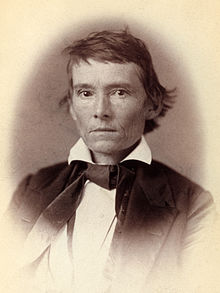Alexander Stephens
| Alexander H. Stephens | |
|---|---|
 |
|
| 50th Governor of Georgia | |
|
In office November 4, 1882 – March 4, 1883 |
|
| Preceded by | Alfred Colquitt |
| Succeeded by | James Boynton |
| Vice President of the Confederate States | |
|
In office February 22, 1862 – May 11, 1865 Provisional: February 11, 1861 – February 22, 1862 |
|
| President | Jefferson Davis |
| Preceded by | Position established |
| Succeeded by | Position abolished |
| Member of the U.S. House of Representatives from Georgia's 8th district |
|
|
In office December 1, 1873 – November 4, 1882 |
|
| Preceded by | John Jones |
| Succeeded by | Seaborn Reese |
|
In office March 4, 1853 – March 3, 1859 |
|
| Preceded by | Robert Toombs |
| Succeeded by | John Jones |
| Member of the U.S. House of Representatives from Georgia's 7th district |
|
|
In office March 4, 1845 – March 3, 1853 |
|
| Preceded by | Constituency established |
| Succeeded by | David Reese |
| Member of the U.S. House of Representatives from Georgia's At-large district |
|
|
In office October 2, 1843 – March 3, 1845 |
|
| Preceded by | Mark Cooper |
| Succeeded by | Constituency abolished |
| Member of the Georgia Senate | |
|
In office 1842 |
|
| Personal details | |
| Born |
Alexander Hamilton Stephens February 11, 1812 Crawfordville, Georgia, U.S. |
| Died | March 4, 1883 (aged 71) Atlanta, Georgia, U.S. |
| Political party |
Whig (1836–51) Unionist (1851–60) Constitutional Union (1860–61) Democratic (1861–83) |
| Alma mater | University of Georgia |
| Religion | Presbyterianism |
| Signature | |
Alexander Hamilton Stephens (February 11, 1812 – March 4, 1883) was an American lawyer and politician from Georgia, and the Confederate vice president throughout the American Civil War. His Cornerstone Speech of March 1861 defended slavery in the most uncompromising terms, though after the war he tried to distance himself from his earlier sentiments. In the course of the war, he became increasingly critical of Confederate President Jefferson Davis's policies, especially conscription and the suspension of habeas corpus. In February 1865, he was one of the commissioners who met with Lincoln at the abortive Hampton Roads Conference to discuss peace terms. After his arrest, and subsequent pardon, (for his part in the rebellion), Stephens went on to again serve in Congress, and later as the 50th Governor of Georgia; shortly before his death.
Stephens was born on February 11, 1812. His parents were Andrew Baskins Stephens and Margaret Grier.
The Stephenses lived on a farm near present-day Crawfordville, Taliaferro County, Georgia. At the time of Alexander Stephens's birth, the farm was part of Wilkes County. Taliaferro County was created in 1825 from land in Greene, Hancock, Oglethorpe, Warren, and Wilkes counties.
His father, a native of Pennsylvania, came to Georgia at 12 years of age, in 1795. According to the Biographical Sketch of Linton Stephens (Linton Stephens being Alexander Stephens's half-brother), Andrew B. Stephens was "endowed with uncommon intellectual faculties; he had sound practical judgment; he was a safe counselor, sagacious, self-reliant, candid and courageous."
His mother, a Georgia native and sister of Grier's Almanac founder Robert Grier, died in 1812 at the age of 26; Alexander Stephens was only three months old. In the introduction to Recollections of Alexander H. Stephens, there is this about his mother and her family: "Margaret came of folk who had a liking for books, and a turn for law, war, and meteorology." The introduction continues: "In her son's character was a marked blending of parental traits. He [Alexander Stephens] was thrifty, generous, progressive; one of the best lawyers in the land; a reader and collector of books; a close observer of the weather, and father of the Weather Bureau of the United States."
...
Wikipedia
